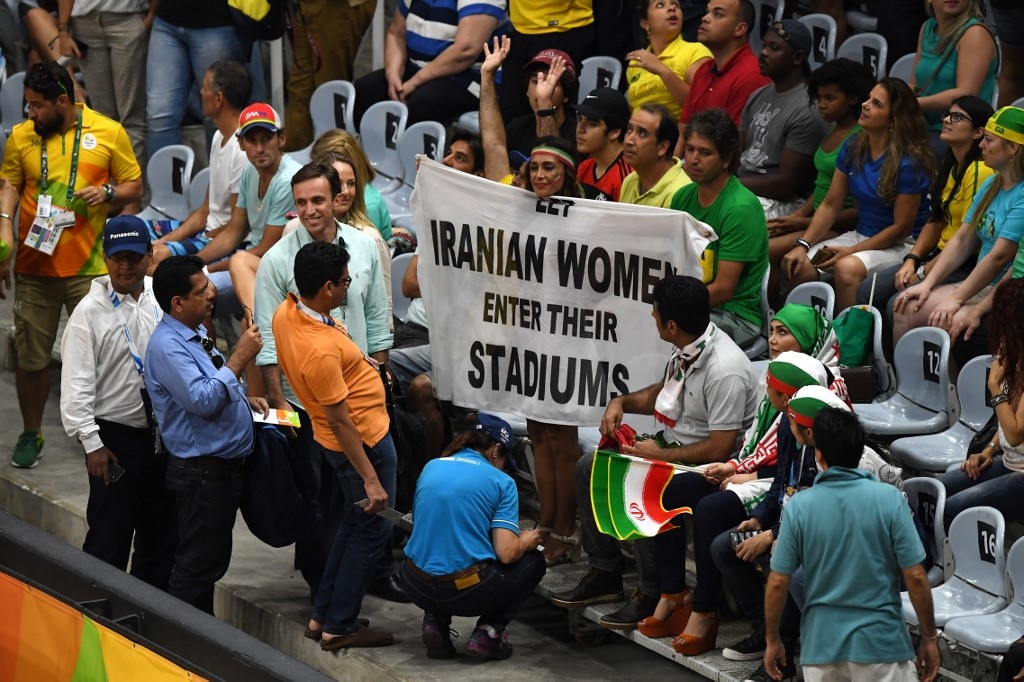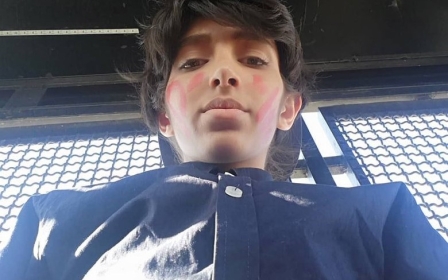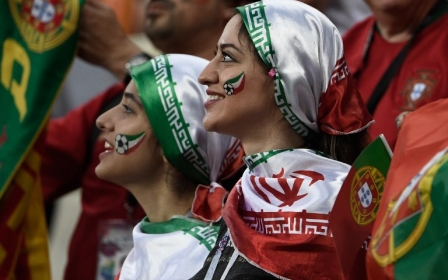Iranian football fan's suicide heaps criticism on women stadium ban

The suicide of an Iranian football fan has piled pressure on her country's restrictions on women attending matches following her death on Monday from horrific injuries.
Sahar Khodayari set herself on fire last week outside a courthouse, where she was being charged for "appearing in public without a hijab".
Khodayari, known as the "Blue Girl" on social media after the colour of her favourite team Esteghlal, was arrested in March for sneaking into a football game disguised as a man.
Last week, she reportedly overheard people speculating outside the court that she could be sentenced to up to two years in prison.
Khodayari was charged with "openly committing a sinful act by appearing in public without hijab" and "insulting officials" at the Revolutionary Court in Tehran on 2 September.
New MEE newsletter: Jerusalem Dispatch
Sign up to get the latest insights and analysis on Israel-Palestine, alongside Turkey Unpacked and other MEE newsletters
She had been stopped by security staff trying to enter Iran's national football stadium in Tehran to watch Esteghlal compete against the Emirati team Al-Ain during the AFC Asian Cup.
Since Iran's 1979 Islamic Revolution, women have been prohibited from entering stadiums where men's teams are playing.
Online, people are mourning Khodayari's death using the hashtag #blue_girl and calling on football’s world governing body FIFA to take action.
Rights groups have criticised Iran’s ban on women entering football stadiums, which is not written into law but strictly enforced by the country's authorities and security at events.
FIFA officials are expected to go to Iran within the next two weeks as part of the country's preparations to host World Cup qualifiers. Reuters reported on Wednesday that the officials "will check the preparations" made by Iran to grant women access to those matches.
In June, FIFA's president Gianni Infantino sent a letter to the Iranian football assocation saying the country must take steps to allow women in stadiums, giving a July deadline - that has now passed - to take concrete measures towards inclusion.
At the time, Infantino urged Iran to "ensure that all Iranian and foreign women who wish to do so will be allowed to buy tickets and to attend the matches of the qualifiers for the FIFA World Cup Qatar 2022, which will start in Sepetember 2019".
Iran is set to play its first World Cup qualifier at home at the Azadi stadium against Cambodia on 10 October. However, there has been no indication that women will be allowed to attend, or if Iran will suffer consequences if it fails to permit them.
Photos of Khodayari in hospital covered in bandages from wounds have circulated widely on social media and been used to raise awareness of the issue.
Human Rights Watch called for action to be taken: "FIFA's long delay in enforcing its own rules means the ban continues and leaves the brave women and girls in Iran who challenge the ban exposed to harassment, beatings and arrests by the Iranian authorities.
"FIFA urgently needs to uphold its own human rights rules, end gender discrimination and punish violators."
Philip Luther, Amnesty International’s Middle East and North Africa research and advocacy director, called the case "heartbreaking".
“What happened to Sahar Khodayari is heartbreaking and exposes the impact of the Iranian authorities’ appalling contempt for women’s rights in the country,” he said.
“This discriminatory ban must end immediately and the international community, including football’s world governing body, FIFA, and the Asian Football Confederation, must take urgent action."
Last year, a photo of an Iranian football fan went viral on social media after she was detained for watching a match in Iran while dressed as a man.
Several top football teams have tweeted their support to female football fans in Iran following Khodayari's death.
Meanwhile, the former captain of the Iranian national football team, Andranik Teymourian, predicted that one of Tehran's major stadiums would be named after Khodayari in the future.
International helplines can be found at www.befrienders.org. In the UK and Ireland, Samaritans can be contacted on 116 123 or www.samaritans.org. In the US, the National Suicide Prevention Lifeline is 1-800-273-8255.
Middle East Eye delivers independent and unrivalled coverage and analysis of the Middle East, North Africa and beyond. To learn more about republishing this content and the associated fees, please fill out this form. More about MEE can be found here.




